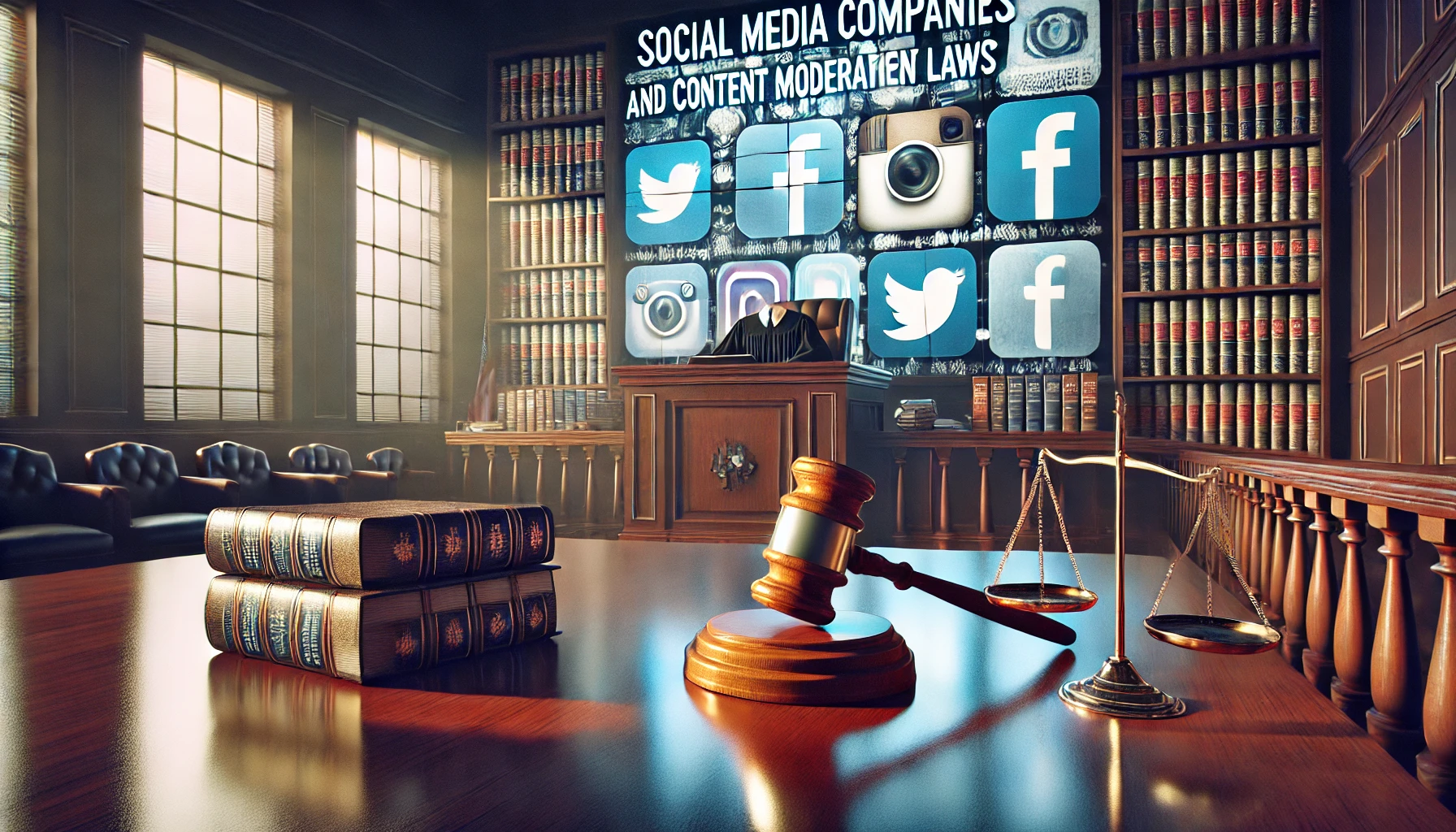Social media platforms have become the backbone of global communication, shaping how billions interact, share information, and express opinions. However, the increasing prevalence of misinformation, hate speech, and other harmful content has sparked fierce debates about the role these platforms should play in moderating user posts. Legal battles and legislation redefine the boundaries of free speech and corporate responsibility, creating a complex intersection of law, technology, and society. Understanding how these frameworks impact AI content moderation tool is crucial as the world seeks to balance safety and freedom online.
1. What is Content Moderation?
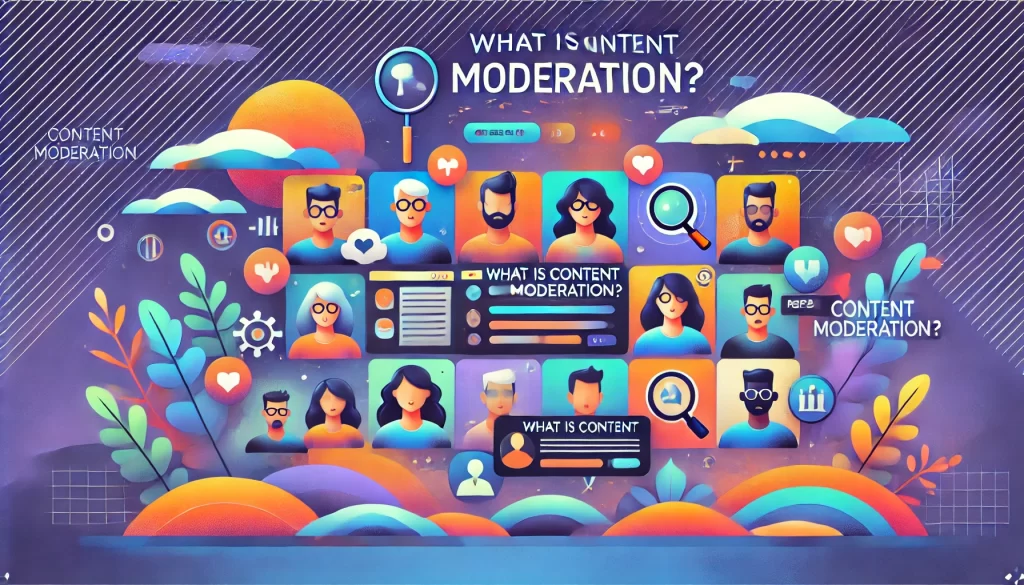
Content management refers to monitoring, reviewing, and managing user-generated content on digital platforms. Social media companies employ automated tools and human oversight to enforce their community guidelines. Moderation typically focuses on removing harmful content such as misinformation, explicit material, cyberbullying, and incitement to violence.
Platforms like Facebook, YouTube, and TikTok utilize algorithms to scan content for violations. For example, AI-powered systems can identify potentially harmful keywords or analyze images for explicit content.
2. The Debate on Content Moderation

It has ignited a tug-of-war between free speech advocates and proponents of safer online spaces. On one side, stricter moderation is vital to prevent the spread of misinformation and protect vulnerable groups. Conversely, critics argue that such measures can suppress legitimate discourse and lead to tech companies’ overreach.
Take the example of pandemic-related misinformation. Platforms ramped up moderation efforts to combat false claims about vaccines and treatments, but this also led to accusations of political bias and censorship. The debate extends to whether companies should act as arbiters of truth or leave content untouched, letting users navigate the digital landscape freely.
3. Key Legal Cases Shaping Content Management Laws

3.1. Section 230 of the Communications Decency Act
Enacted in 1996, Section 230 protects social media companies from third-party content on their platforms, allowing them to moderate posts without fear of lawsuits. This law is often credited with enabling the Internet’s growth by encouraging innovation and free expression. However, critics argue it shields platforms from accountability, even in negligence cases.
Debates around Section 230 reform have intensified, with proposals ranging from limiting its protections to holding platforms liable for specific types of content. High-profile figures, including lawmakers and former presidents, have called for its repeal, framing it as a tool for unchecked censorship.
3.2. State vs. Federal Lawsuits
Recent legal battles in states like Texas and Florida test the limits of Post oversight laws. Texas’ HB20 prohibits platforms from removing content based on users’ political views, while Florida’s SB7072 imposes penalties for DE platforming political candidates. These laws directly challenge Section 230 and have sparked lawsuits from industry groups, arguing they infringe on companies’ First Amendment rights.
As these cases progress through the courts, they could redefine the relationship between state governments and tech companies, setting new precedents for content regulation nationwide.
4. Recent Developments in Content Moderation Lawsuits
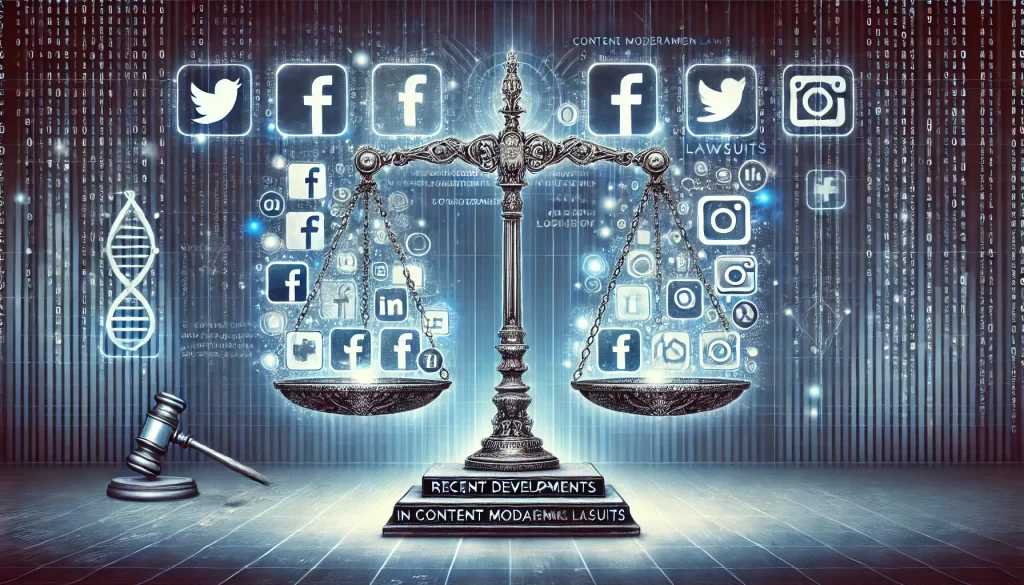
4.1. Supreme Court Involvement
The Supreme Court is now weighing in on cases that question the boundaries of Section 230 and platform liability. These rulings could alter the protections afforded to tech companies, forcing them to reconsider their moderation strategies. For instance, recent cases have explored whether platforms can be held responsible for algorithmically amplifying harmful content, a shift that could expose them to lawsuits.
4.2. Global Perspective
Countries globally are implementing stricter regulations on digital platforms. The European Union’s Digital Services Act (DSA) imposes transparency and accountability requirements on tech companies, including mandates for faster content removal and algorithmic audits. Compared to the U.S., the DSA represents a more aggressive approach to holding platforms accountable, highlighting the divergence in international Community standards enforcement standards.
5. Impact of Post Oversight Laws on Social Media Companies

The evolving legal landscape has forced social media companies to adapt their policies and practices. Compliance with new laws often requires significant investments in moderation technologies, legal teams, and transparency measures. For instance, platforms might need to disclose how their algorithms work or establish appeal processes for content takedowns.
At the same time, these changes raise questions about profitability. Increased scrutiny and regulatory compliance costs can affect a platform’s bottom line, especially for smaller companies. Striking a balance between adhering to laws and maintaining user engagement remains challenging as platforms navigate the pressures of a rapidly changing digital ecosystem.
6. Role of Public Opinion in Shaping Content Moderation Policies

Public opinion is decisive in influencing how social media platforms approach Content review. High-profile controversies—such as banning former U.S. President Donald Trump from Twitter and Facebook—have sparked heated debates about the balance between free speech and platform responsibility. In such instances, public sentiment often shapes the narrative, pressuring companies to adjust their policies.
User feedback, activism, and organized boycotts also contribute to policy shifts. For example, the #StopHateForProfit campaign urged advertisers to withdraw from Facebook until more robust measures against hate speech were implemented. Platforms must weigh these pressures against their commitment to free expression, sometimes resulting in inconsistent enforcement or perceived favoritism.
7. Technological Advancements and Their Role in Moderation

7.1. AI in Content Review
Artificial Intelligence (AI) has revolutionized it by enabling platforms to scale their efforts. AI tools can scan millions of posts, videos, and comments in real time, flagging potentially harmful content for review. For instance, platforms like YouTube use machine learning algorithms to detect copyright violations and explicit content.
7.2. Human Moderation vs. Automation
Human moderators remain essential in addressing nuanced cases that AI cannot handle. These workers review flagged content, make judgment calls, and provide context-sensitive decisions. However, the job comes with challenges, including exposure to disturbing material and the potential for mental health issues.
Combining human oversight with AI tools offers the most effective solution. This hybrid approach will likely dominate the future of content management, allowing platforms to handle large volumes of content while ensuring fairness and accuracy.
8. The Free Speech vs. Platform Rights Debate
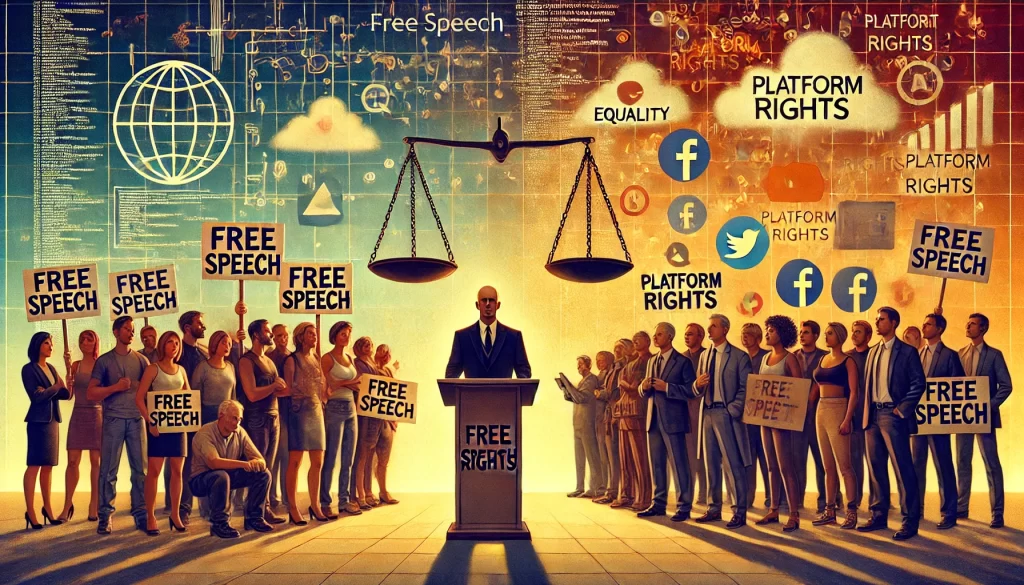
One of the most contentious issues in Content curation is the tension between free speech and platform rights. As private companies, social media platforms argue they have the right to enforce their own rules, much like a business can refuse service to customers who violate its policies. Critics counter that these platforms have become digital public squares and should uphold free speech principles.
Legal experts grapple with whether platforms should be treated as publishers with editorial discretion or neutral conduits that must allow all lawful content. This debate underpins many legal challenges, including those targeting Section 230.
High-profile cases, such as banning controversial figures like Alex Jones and Andrew Tate, illustrate the complexities. While some celebrate these actions as steps toward safer online spaces, others decry them as censorship. This dichotomy fuels ongoing discussions about the appropriate role of platforms in regulating speech.
9. How Content Moderation Affects Users

Social media monitoring directly impacts users, shaping their online experience and access to information. Proactive moderation can create safer spaces for marginalized communities by curbing harassment and hate speech. However, overly aggressive policies can inadvertently silence voices that challenge mainstream narratives, leading to accusations of bias.
Selective enforcement is another concern. Critics argue that platforms apply their rules inconsistently, often influenced by political or commercial interests. For example, while some accounts face immediate bans for violating guidelines, others receive leniency, sparking outrage and claims of favoritism.
10. Future Trends in Community Standards Enforcement Laws
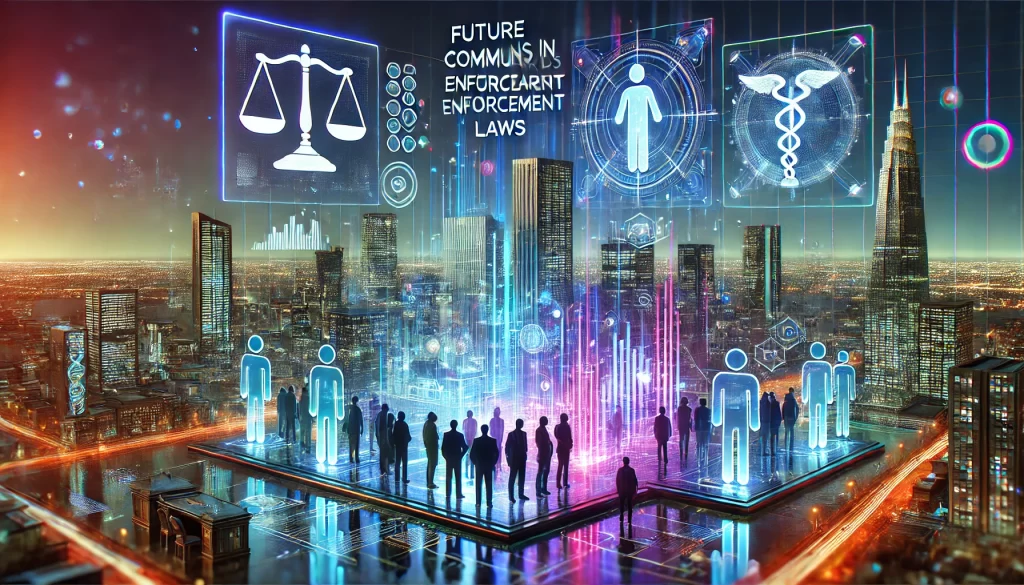
The future of content management laws will likely see more significant global divergence. In the U.S., ongoing debates around Section 230 and state-level laws could result in significant reforms. On the other hand, regions like the European Union are pushing ahead with comprehensive frameworks like the Digital Services Act, emphasizing accountability and transparency.
Technological advancements will also shape the future. Improved AI systems, better tools for detecting misinformation, and real-time moderation capabilities could transform platforms’ operations. However, these innovations must address bias, privacy, and user autonomy issues.
Another trend to watch is the rise of decentralized platforms and Web3 technologies. These systems promise greater user control but pose challenges for enforcing moderation standards. Finding the right balance between freedom and safety will remain an enduring challenge as the Internet evolves.
11. The Role of Governments in Regulating Content Moderation
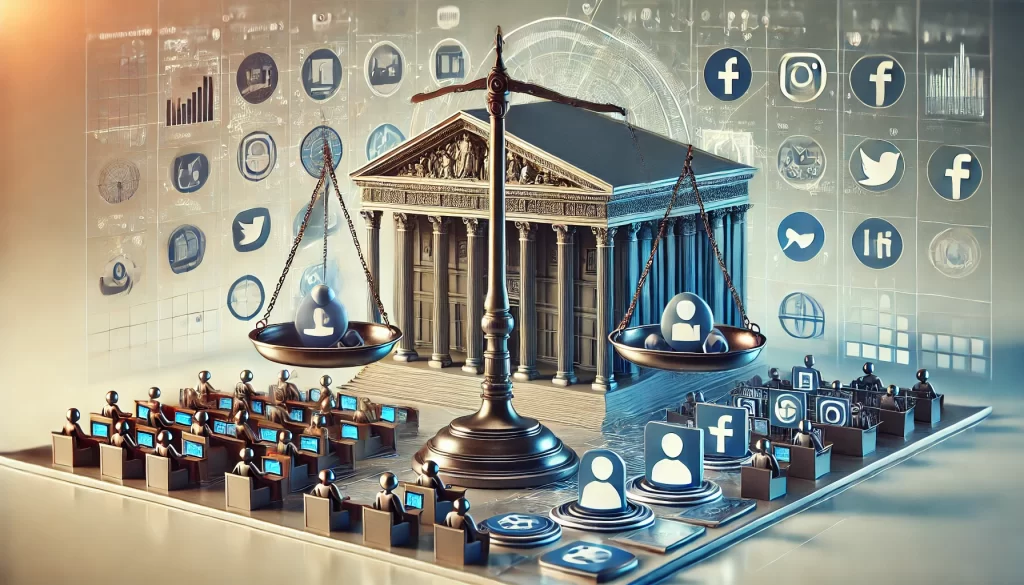
Governments worldwide are more active in regulating how platforms moderate content. The U.S. government, for instance, has debated reforms to Section 230, with lawmakers proposing various approaches ranging from increased platform accountability to outright repeal. These discussions underscore the tension between safeguarding free speech and ensuring online safety.
In contrast, the European Union’s Digital Services Act (DSA) establishes stringent requirements for transparency, user rights, and content removal timelines. Countries like India have also introduced regulations mandating platforms to identify the origins of specific content, raising privacy concerns.
Government involvement often reflects cultural and political values, challenging global consensus on it. While some nations push for stricter laws to curb harmful content, others worry about the potential misuse of these laws to suppress dissent. Governments must carefully balance regulatory enforcement with preserving the openness of the Internet.
12. The Economic Implications of Community Standards Enforcement

It has significant economic consequences for social media companies. Complying with legal requirements often involves substantial investments in technology, legal teams, and human moderators. For instance, hiring thousands of moderators or developing advanced AI tools can strain resources, particularly for smaller platforms.
On the revenue side, advertisers increasingly demand safer online environments to protect their brand reputation. Platforms with effective moderation systems are better positioned to attract advertisers, while those that fail to curb harmful content risk losing revenue.
13. Ethical Challenges in Content Moderation
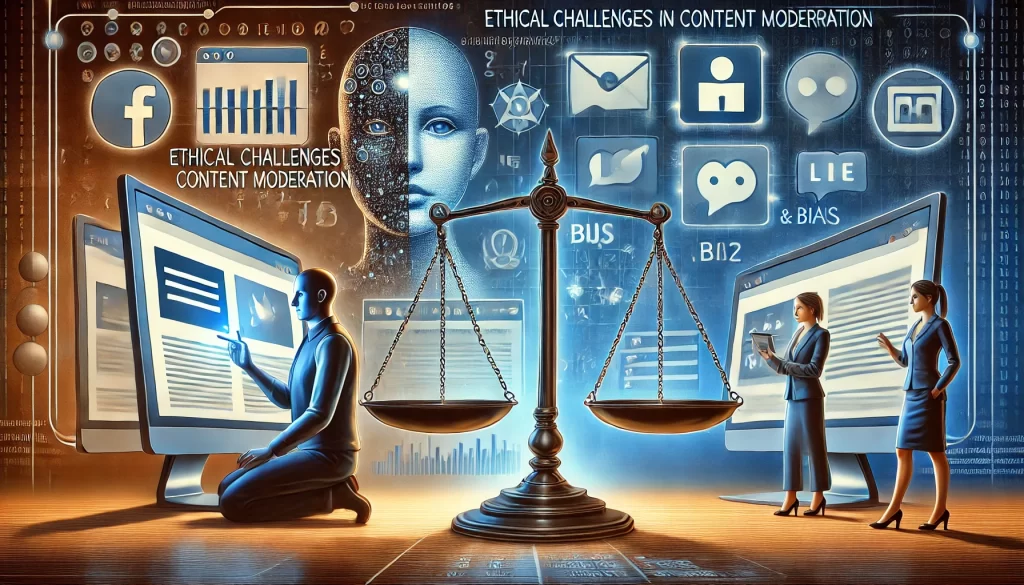
It raises several ethical dilemmas. Determining what constitutes harmful content often depends on subjective interpretations, which can vary across cultures and communities. For example, a meme deemed offensive in one region might be considered harmless in another.
Another ethical concern is the mental health of human moderators. These individuals are frequently exposed to graphic and disturbing content, leading to burnout and trauma. Companies face growing pressure to provide better support and safeguards for these workers.
Lastly, there’s the issue of algorithmic bias. AI systems used for moderation can reflect the biases of their creators, disproportionately targeting specific groups or failing to identify subtle forms of harm. Ethical Community standards enforcement requires ongoing efforts to address these biases while ensuring fairness and inclusivity.
14. The Role of Civil Society and Advocacy Groups

Civil society organizations and advocacy groups are crucial in shaping content management policies. These groups often highlight the shortcomings of platform moderation, advocating for greater accountability and inclusivity. For instance, organizations focused on digital rights push for transparent guidelines and appeal mechanisms to protect users from arbitrary enforcement.
Advocacy groups also amplify the voices of marginalized communities, ensuring their concerns are addressed in policy discussions. Campaigns like #MeToo and #BlackLivesMatter have demonstrated the power of social media in driving social change, but they also underscore the need for platforms to manage harmful backlash effectively.
[ruby_related heading=”More Read” total=5 layout=1 offset=5]
Collaboration between platforms, governments, and civil society can lead to more balanced moderation policies that reflect diverse perspectives. This partnership is essential for creating safer and more equitable online spaces.
15. The User’s Role in Shaping the Future of Content Review
Individual users have a significant influence on the future of content moderation. By reporting harmful content, providing constructive feedback, and participating in public discussions, users can help shape platform policies. Collective actions, such as boycotting platforms or demanding transparency, often force companies to reconsider their practices.
The Future of Moderation: Balancing Privacy and Safety
Its legal and ethical landscape is constantly evolving, driven by technological advancements, societal expectations, and legal challenges. Social media platforms find themselves at the intersection of conflicting demands—ensuring free expression while protecting users from harm. Recent developments in laws and regulations, such as debates around Section 230 and international frameworks like the Digital Services Act, highlight the growing complexity of this issue.
As users, governments, and companies navigate these challenges, collaboration and transparency will be critical to striking the right balance. While no solution is perfect, ongoing dialogue and innovation can help create a safer and more equitable digital ecosystem.
